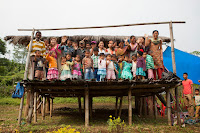A Practical Guide to Assessing Multilingual Learners for Inclusive Education(UNESCO/UNICEF)
Assessment of the progress that children make in learning can be a hot topic. For government officials it can be something they are held accountable to, for parents it can make them evaluate the school and even more important: for teachers it can help them know how well the children are doing. But little is known on how to do assessment in a multilingual classroom. This new publication with guidelines is therefore more than welcome, especially because it is based on real classroom experiences and founded in solid theoretical frameworks. It is a good start as I am sure much more will be learned over the coming years as the reality of multilingual classrooms is more embraced! The UNESCO Regional Office in Bangkok and UNICEF East Asia and Pacific Regional Office have released the document "Guidance for the Classroom-Based Assessment of Multilingual Learners: Assessing Languages, Literacies, and Learning across the Curriculum." This publication is designed to empower multilingu...



